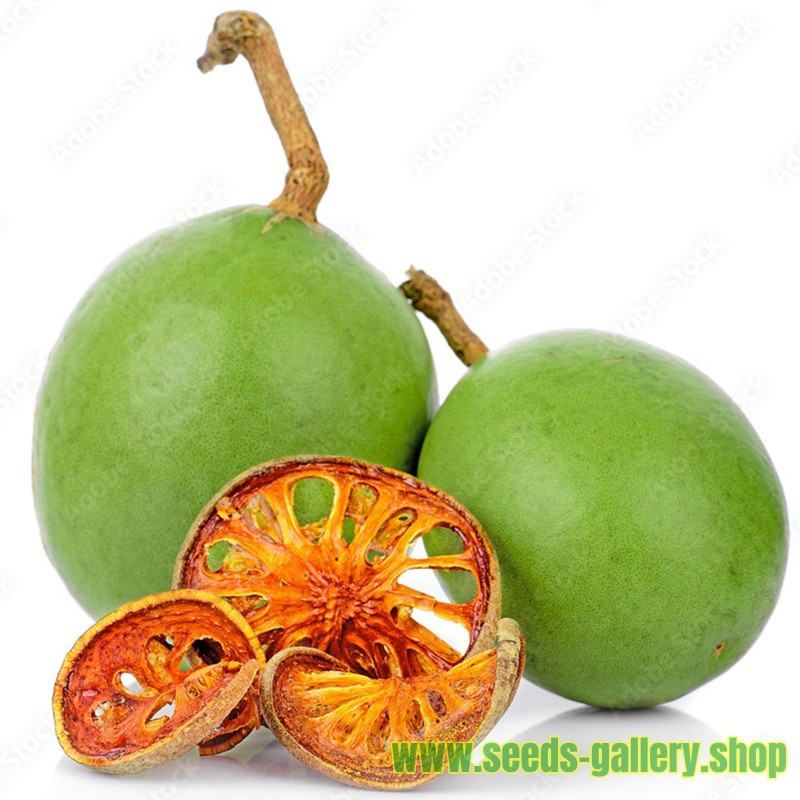- -15%








Botanical information
Bael is the only member of the monotypic genus Aegle. It is a mid-sized, slender, aromatic, armed, gum-bearing tree growing up to 18 meters tall. It has a leaf with three leaflets.
Bael occurs in dry forests on hills and plains of northern, central and southern India, southern Nepal, Sri Lanka, Myanmar, Pakistan, Bangladesh, Vietnam, Laos, Cambodia and Thailand. It is cultivated throughout India, as well as in Sri Lanka, the northern Malay Peninsula, Java, the Philippines, and Fiji. It has a reputation in India for being able to grow in places that other trees cannot. It copes with a wide range of soil conditions (pH range 5-10), is tolerant of waterlogging and has an unusually wide temperature tolerance (from -7°C to 48°C). It requires a pronounced dry season to give fruit.
This tree is a larval foodplant for the following two Indian Swallowtail butterflies
Fruit
The bael fruit has a smooth, woody shell with a green, gray, or yellow peel. It takes about 11 months to ripen on the tree and can reach the size of a large grapefruit or pomelo, and some are even larger. The shell is so hard it must be cracked with a hammer or machete. The fibrous yellow pulp is very aromatic. It has been described as tasting of marmalade and smelling of roses. Numerous hairy seeds are encapsulated in a slimy mucilage.
Uses
The fruit is eaten fresh or dried. If fresh, the juice is strained and sweetened to make a drink similar to lemonade. It can be made into sharbat (Hindi) or Bela pana (Oriya: ବେଲ ପଣା) or bel pana (Bengali: বেল পানা), a refreshing drink made of the pulp with water, sugar, and lime juice, mixed, left to stand a few hours, strained, and put on ice. One large bael fruit may yield five or six liters of sharbat.
If the fruit is to be dried, it is usually sliced and sun-dried. The hard leathery slices are then simmered in water.
The leaves and small shoots are eaten as salad greens.
The Tamil Siddhars call the plant koovilam (கூவிளம்) and use the fragrant leaves for medicinal purposes, including dyspepsia and sinusitis.
Medicinal Uses
Research has found the essential oil of the Bael tree to be effective against 21 types of bacteria. It is prescribed for smooth bowel movement to patients suffering from constipation and other gastrointestinal problems.
Research also indicates that unripe Bael fruit is effective in combating giardia and rotavirus. While unripe Bael fruit did not show antimicrobial properties, it did inhibit bacteria adherence to and invasion of the gut (i.e. the ability to infect the gut).
|
Sowing Instructions |
|
|
Propagation: |
0 |
|
Pretreat: |
soak in water about 24 h |
|
Stratification: |
0 |
|
Sowing Time: |
all year round |
|
Sowing Depth: |
1 cm |
|
Sowing Mix: |
Coir or sowing mix + sand or perlite |
|
Germination temperature: |
18-25 ° C + |
|
Location: |
bright + keep constantly moist not wet |
|
Germination Time: |
about 2-6 weeks |
|
Watering: |
Water regularly during the growing season |
|
|
|
Datasheet
 Beoordelingen (0)
Beoordelingen (0)